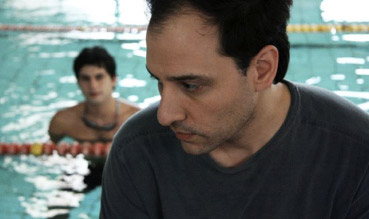|
Argentinean
director Marco Berger follows the sunny-side up subversion of festival
favourite Plan B with this utterly
unexpected but completely riveting foray into slow–burn, psycho-sexual
tensions. Like Plan B before it, the
director once more accents psychological preconditions – specifically, latent or unexpressed
homosexuality – but for his second film he's gone to a considerably
darker place and found himself squarely in thriller territory. And what a
thriller it is. If I see a better film this year that simultaneously subverts
and invigorates genre expectations with such effortlessness, I'll doff my critic's
cap and eat it.
Absent is a sexually repressed, class-A creep
out worthy of Hitchcock, recalling the ambiguous attractions of Strangers on a Train and explicitly referencing the first act switcheroo of Psycho,
which Berger has gone on record about structurally imitating.
Disjointed
framing and scuzzily flesh-focused close-ups introduce us to
Martin
(Javier de Pietro), a teen physically mature beyond his years, hair sprouting
everywhere. Watching Martin undress, his physically rippling frame seems to
be growing right before our eyes like some kind of teenage Bruce Banner. The
hormones are raging and the child's eyes trapped in an outsized shell burn with
the rankling inequality of desire. Not only is Martin a secretly gay high
schooler, trying to keep up appearances with his laddish best friend and fend
off the advances of the class hottie, he's also got a thing for his swim coach
Sebastian (Carlos Echevarria). An intimately unnerving title sequence of locker
room reflection finds Martin at the tipping point where gall turns to
conviction. In the grip of desires he can no longer keep a lid on, he takes no
pause before deciding to manipulate his way into spending the night at
Sebastian's house. The turning of screws that get him there – each lie more
transparently insidious – have a certain noirish fatalism; Martin as the femme
fatale, Sebastian the hapless victim. Beger has fashioned a clever premise,
relying on our inbuilt expectations of the genre's normative gender models
(unhinged female student stalks professor who should know better / lascivious
older teacher preys on impressionable, nubile young girl), to misdirect and
surprise us. Skirting cliché and
splintering off into un-guessable directions, the gender switch is only the first
of many rules broken. The teacher-student dialogue has an awkward formality
outside school grounds which becomes anxiously forced the closer they get to
Sebestian's house. By the time Martin crosses the threshold there's a sense
that anything can – and will – happen.

Though
far from a diabolical, teenage tormenter (The
Page Turner, We Need To Talk About
Kevin), Martin is someone who only schemes so far ahead; not really knowing
how to proceed once Sebastian has invited him to stay the night. Cunning but
not calculated, the emphasis on nervously exchanged glances (previously shared
poolside), is such that we can feel Martin silently willing his teacher to not see through his flimsy fabrications,
deliriously hopeful that something will happen between them. As this
possibility becomes more likely, the intensity of his attraction gives him
away, impossible for Sebastian to miss. Hardly sympathetic, Martin is never
quite a hissable villain, so you have to wonder about Sebastian's motivations.
The solicitous courtesy of driving Martin around town – the hospital,
his grandmother's house, his best friend's and finally his place – is too eager
to be entirely squeaky clean. His hesitancy to engage in inappropriate
behaviour is all over his face but tepidly voiced, totally overwhelmed by new,
conflicting emotions his pupil arouses in him. The assertiveness of Martin's desire in the face of such confusion, steamrolls Sebastian into
gullible compliance, as childlike as his manipulator. He has the authority, yet
at every opportunity, chooses not to confront what's now obvious to both of
them. Not acknowledging the aggressiveness of Martin's gaze is to conveniently
ignore how uncomfortable that makes him feel as a straight man with a
noticeably absent girlfriend. Sebastian indulges Martin's attentions to avoid
openly talking about them, like his student waiting to see if something will happen.
A
night spent together in close quarters is armchair-gripping, but Sebastian left
alone to question his sexuality and sanity the morning after is where the film
becomes impressively panicked; Carlos Echevarria enacting one of the most
buttoned up, implosive meltdowns ever seen on-screen.

What
happens next is something I'm not at liberty to spoil, suffice it to say, an
event occurs which keeps teacher and student apart in the film's second half,
denying Sebastian the closure he's left urgently seeking. In Martin's absence,
the passions awoken in Sebastian are infinitely more complex than a simple
question of gay or straight. The young man's coy advances have presented him
with possibilities he stopped looking for years ago and planted the notion that
something urgent needs to happen to shake up his safely routine, but unexciting
life. In the cold light of day it's possible Sebastian may not reciprocate
Martin's infatuation, but what he can't ignore is the fact that suddenly
there's this boy who cares about him in a way that's entirely absent from his
functional, loveless relationship.
Unable
to talk it out with Martin, Berger sifts through Sebastian's feelings of isolated
abandonment with a delicacy that echoes the sorrow and loneliness of J-horror.
Berger even goes as far as visually evoking the genre in the denouement;
Sebastian's ghostly imaginings of what might have been, the perfect melancholic
grace note to end a rare psychological thriller which goes far beyond simply chilling
and deeply moves.
Deserving
to find wider exposure outside the gay audience, the film's DVD release this
past Monday from Network Releasing is an essential purchase. Available on its
own or as part of a 2-pack* with Plan B under the "Made in Argentina" label, the films of Marco Berger come with our
highest recommendation.
Screened at the 26th BFI London Lesbian & Gay Film Festival.
If you want to check out the film on the big screen, it's playing April 20th at 10pm as part of the Argentine Film Festival at the Ritzy Picturehouse in Brixton. You can book tickets here.
*Includes the making of Plan B, English interviews, short film "Una
Ultima Voluntad" (A Last Wish), deleted scenes and image gallery.
|